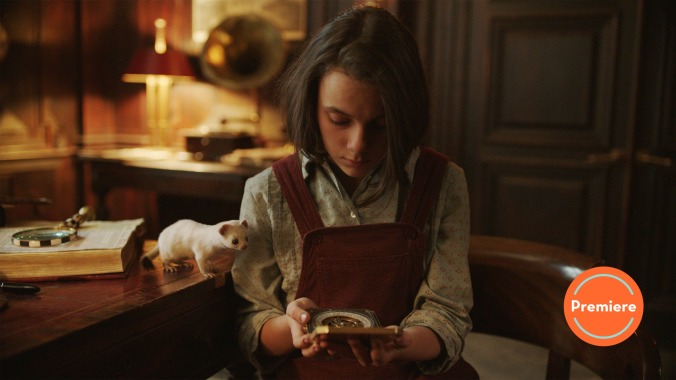His Dark Materials kicks things off by depending on its actors to sell a lot of exposition (newbies)

Welcome to His Dark Materials, a show with a frankly mystifying title! Who’s he? What are his materials? What makes them so shady? That’s what we’re here to find out, though the pilot offers few clues on that particular mystery, and an abundance of scene setting. By the end of the first episode, the show has introduced a series of power players, set them up through one locale, and then booted them all out of it.
We’re left, perhaps because of this long roll call of people, with some opaque character choices. Asriel, Lyra’s only known relative, is outright cruel to her repeatedly, threatening to break her arm when they first interact after a year apart, then trying to leave without saying goodbye. And yet when he discovers that he’s survived an assassination attempt by mere chance, he brushes it off. He also asks Lyra to spy on a group of men that he’s perfectly able to observe himself, then asks her no details about what she might have noticed. Is he lying to her about why he needed her there, and this was just an opportunity for her to learn about his work? James McAvoy is a talented enough actor that he’s able to suggest there’s some deeper meaning behind Asriel’s brash cruelty, but the scene still reeks of plot mechanics. We the audience need to see that meeting, so Lyra is in there.
Lyra’s lack of understanding about what’s going on around her serves as cover for much of these early shenanigans, since it’s essentially the same confusion the audience experiences. Why did the Master so quickly surrender Lyra to Mrs. Coulter? Lyra doesn’t seem to wonder, so we’re left to wonder for her. For someone who’s spent her entire life in one place, she leaves it awfully quickly. Dafne Keen, fresh off a run as a different fateful child in Logan, brings a similar intensity to Lyra, but her scenes with her friend Roger, which should function as the time she’s most herself, are some of the most overburdened with exposition. The two child actors are left with some fairly wooden dialogue to get through these moments, which makes it hard to tell how well they’ll do once these early building blocks are out of the way. Roger is essentially a walking expository device in this episode, while simultaneously functioning as Lyra’s sounding board and, with the exception of her uncle, the sole human with whom she experiences any emotional bond. That’s a lot for one little boy!
But he also serves up some of the most genuine tension here. We’ve already been taught to fear the daemon with the glowing eyes by the time it strolls by him, and the show wisely doesn’t even show Roger’s capture. We see only how alone he is, and then he’s gone. Lyra’s panicky efforts to find him also emphasize how easy it is for a child like him to fall through the cracks—to the other kitchen staff, his absence just seems to be one less person to help out. Without her advocacy, it’s easy to see why the Gobblers, or whatever they actually are, would target this specific child. And even if the show has made more of a point of telling us he matters to Lyra than showing us, his capture gives her more emotional shading than the otherwise somewhat generic hero quest motivation she otherwise has.
The show’s real life parallels are an odd mix so far—Lyra lives in Oxford and is going to London, but obviously in our world, air ships didn’t quite become all the rage. And the Gyptians seem like a pretty obvious riff on real-world Gypsies (rather than Egyptians, but we’ll hold off for further evidence), which makes it not terribly surprising that the Gobblers are targeting their children as well, given their distrust of state law enforcement—they’re pursuing kids whose absence won’t cause a public outcry. Are we meant to think that Lyra has figured out why the Gyptians are also heading to London? She knows Billy Costa is missing.
In the early going, it’s hard to gauge whether this show can rise above “high production value adaptation of beloved property.” When you have so much world-building to do that you have to run some of it in a Star Wars-y scroll right at the beginning, you’re already asking your audience to retain a lot of very detailed information. But hopefully future episodes will unfold a little more organically.
Stray observations
- “Gentleman, he was a member of this college. His work was profoundly important, and I need funding to continue it.” Given the authoritative way McAvoy intoned this line, I really thought it was going somewhere more interesting than “junior faculty member asks for grant money.”
- “Can I see the man’s head?” Lyra has her priorities straight.
- While I have many unanswered questions, my most nagging one is, why does Asriel put her on the bed backwards?? He carries her in there with her shoes on and then puts her head at the foot of the bed. Then her shoes are touching her pillow. That child spends all day running through bird poop on roofs and that is where she is going to lay her face down. Maybe this is just supposed to show us that Asriel is an ineffective guardian, but it will haunt me. Also, I don’t really think 12 year olds can be carried asleep like that anymore.
- Is there a more satisfying word to hear in a British accent than “conTROVersy”? No, there is not.
- Welcome to the newbies recaps! I do have some familiarity with the source material, but also a terrible memory, so I promise to be just as confused as everyone else.